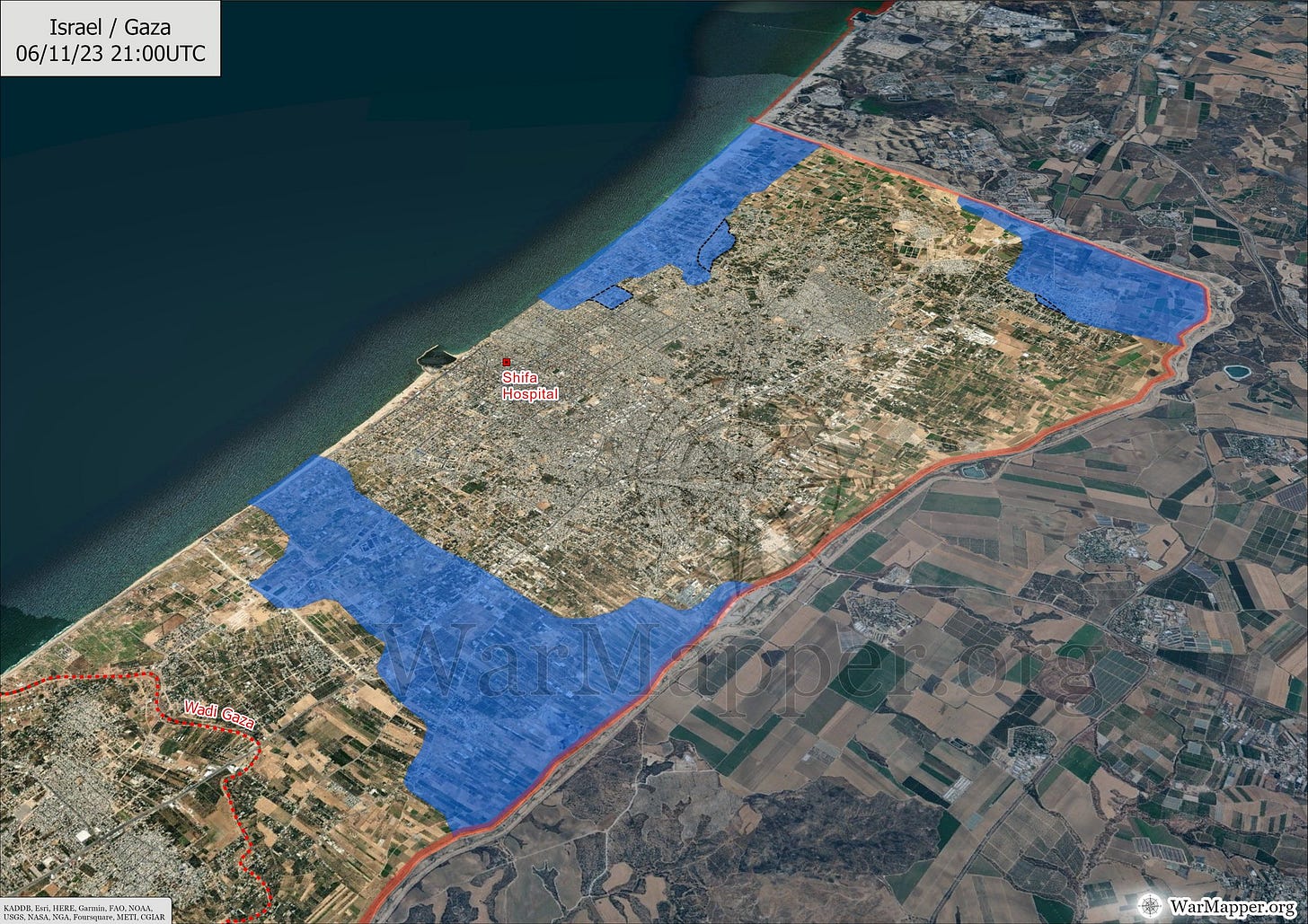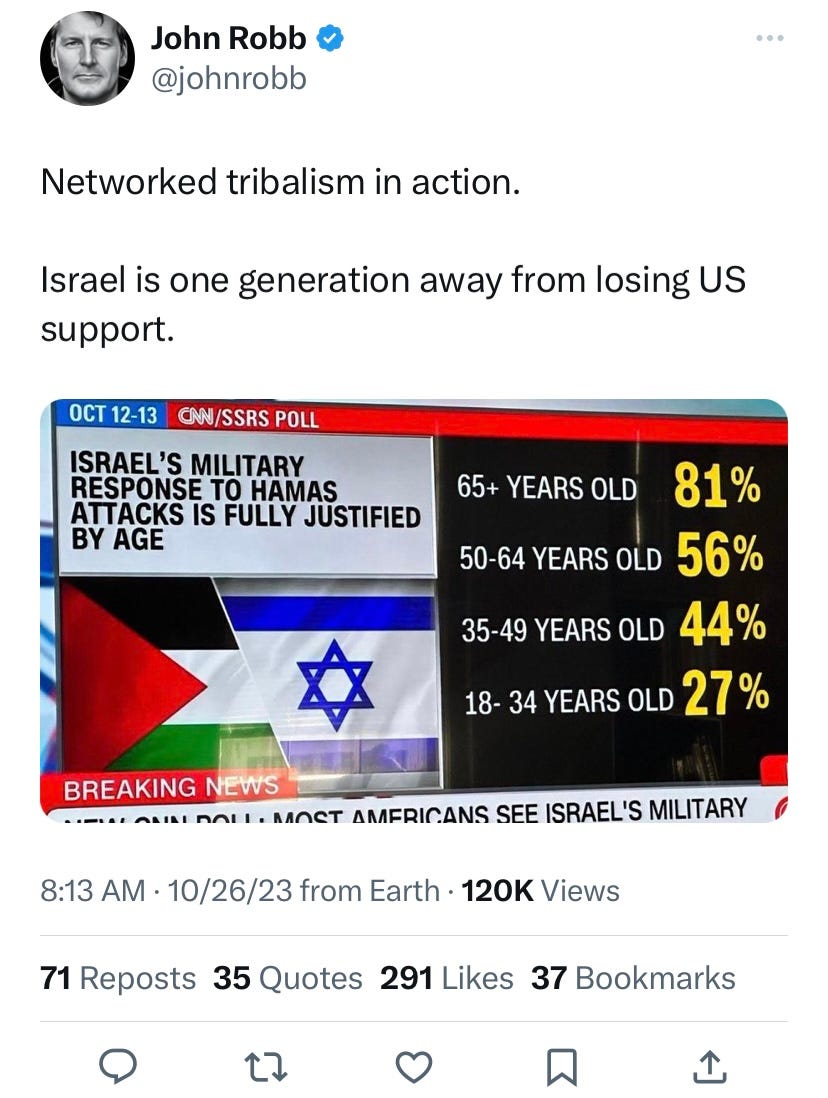Israel Situation Update, Plus Perspectives
Side note: due to the huge amount of information flowing around this topic I can only cover so much ground, so I’m calling on the community to add missing information and your own perspectives in the comments to help inform readers.
South Africa, Chad, Turkey, Honduras, Jordan, Chile, Colombia, recall their diplomats from Israel. Israel criticizes South American nations for cutting ties.
China’s ambassador to the UN calls for an urgent humanitarian ceasefire
Netanyahu makes comment about the future of Gaza, saying that after the war with Hamas is over Israel will need to indefinitely govern the area.
IDF claims 130 Hamas tunnel shafts have been destroyed since the start of its ground operation
Hamas health ministry claims civilian death toll has passed 10,000
IDF has advanced through the middle of Gaza and has now reached the coastline, effectively dividing the region into two halves and encircling Gaza City, where Hamas is reportedly headquartered deep beneath a hospital.
The IDF has opened an evacuation corridor in northern Gaza for the past 5 days, allowing thousands of civilians to safely move south.
IDF says 34 of its men have been killed since the start of the war. Over 300 soldiers were initially killed in the October 7th attack
Hamas spokesperson claims 136 Israeli military vehicles have been either completely or partially destroyed. The statement is unconfirmed by Israeli military
U.S. strongly opposes Israeli governance of Gaza after the war. Secretary of State Anthony Blinken says, “No reoccupation of Gaza after the conflict ends. No attempt to blockade or besiege Gaza. No reduction in the territory of Gaza.”
Egypt objects to helping govern Gaza after the end of the war
Anthony Blinken says the US does not support a ceasefire at this time, saying, “Those calling for an immediate ceasefire have an obligation to explain how to address the unacceptable result that would likely bring.”
U.S. pledges $320 million worth of precision bombs to Israel, in the hope that enhanced accuracy will limit civilian causalities
U.S. deploys Ohio-class nuclear powered submarine to the region, one of the most powerful pieces of equipment in the U.S. arsenal, sending a strong message to potential belligerents
Former Israeli Prime Minister Ehud Olmert calls current PM Netanyahu a “danger to Israel,” says the plan to govern Gaza is wrong direction for Israel
Netanyahu says Israel is open to short humanitarian pause to the war but not a ceasefire
Israeli Heritage Minister Amihai Eliyahu says dropping an atom bomb on Gaza is an option. Israeli Opposition leader Yair Lapid calls the remarks “horrifying and insane.” Netanyahu suspends him until further notice.
IDF has continued to bombard Hezbollah targets in Lebanon, destroyed a large weapons depot and several rocket launching positions over the last several days
Iran’s defense minister warns that the U.S. will be “hit hard” if a ceasefire does not take place in Gaza
Large-scale protests staged in front of Netanyahu's residence, with protests calling for the Israeli PM to resign
More U.S. soldiers injured in attacks against Middle East military bases than was previously disclosed. More than twice the number officially reported have suffered traumatic brain injuries
Perspectives
Hamas has roughly 40,000 fighters but so far its military prowess has seemed lackluster even with the strategic advantage of its complex, miles-long tunnel system—these two things seem to be in contradiction. I’m guessing Hamas’ plan going forward centers around the military strategy of Defense in Depth, or intentionally ceding ground in an attempt only to delay enemy advances with small, successive attacks that degrade momentum and eventually gain an advantageous position over a thinned-out enemy. The Russians, with the brilliant Kutuzov at the head of their army, handed Napoleon his defeat and crushed the same army whose efficiency and skill he witnessed at the Battle of Austerlitz, partly through this strategy.
A public opinion poll of Palestinians conducted in spring of this year found that 2/3rds of Palestinians do not believe Israel will survive beyond 2048. Another small majority of Palestinians believe they will recover lost territories. Both results make it clear that there is very little possibility for a two-state solution when one state wants the other gone completely.
Iran and Hezbollah have issued grave threats to both the U.S. and Israel if the war in Gaza continues but so far these threats have been idle. It seems that either these enemies were paper tigers all along, or perhaps fear of U.S. power runs deeper through the Middle East than many American onlookers figured, or maybe Iran recognizes that it stands to gain more from the closer relationship with U.S. that began to take shape under Biden than from strife and war. There’s a counterintuitive perspective about crime that analogizes well with the last point. The bulk of major U.S. businesses make more money every year than almost all organized crime syndicates in the U.S. combined. A small example: the entire illicit drug trade in the U.S. generates somewhere north of $100 billion a year, which is less than a third of Apple’s annual revenue as of 2021. A trend reversal in the early 20th century made the same true for war, it stopped paying. No longer could armies be like Napoleon’s, sending back millions to the Directory of France during his campaign against the Austrians in Italy. Only a few years ago did Britain finally pay off its debt from the First World War. War stopped paying. Global industry, built on a foundation of peace, has saturated nations in unprecedented wealth and power. Fortunes greater than the spoils of all wars combined are won through trade, innovation, and relationships. Maybe Iran is smart and wants a piece of the pie. It stands to gain very little in a war with a major power.
So far several videos have been released by Hamas showing Al Qassam fighters shooting RPG-7VR’s at Israeli Merkava tanks (this sounds like a lot of jargon, and as it turns out, per my recent descent into military Twitter to learn more about war, the language of war is just pure, unalloyed jargon). The low number of IDF casualties so far tells us that despite these close-range attacks, the new “trophy system” on Israel’s Merkava tanks is highly effective. The trophy system detects anti-tank fire and destroys oncoming projectiles before they reach the armored vehicle. This is pretty cool honestly, almost as cool as the esoteric Merkava name.
In younger generations support for Hamas, or at least vague opposition to Israel, is nearly universal, which serves as a fairly dire warning for the future of Israel if it continues to depend on the U.S. for military and economic support. In 30 years or less it seems the U.S. will hang Israel out to dry as the older stewards of the nation hand off the helm to new blood. I don’t know enough about Israeli leadership to know whether they’re likely to shake off their star and stripe fetters, but smart folks on the ground I follow don’t seem to think so. Israel can be the greatest success story in the Middle East, but it may take new leaders with a bold vision.
It’s interesting that the international community does not expect Egypt or Jordan or any of Israel’s other neighbors to take Palestinian refugees or absorb the entire population to end a conflict that would otherwise be permanent. I agree with Richard Hanania that this would be the best road to peace, but something in the air has filled the minds of foreign ministers with thoughts of political idealism, there’s no realpolitik anymore. There’s nothing pragmatic about the way European leaders view states—states are almost non-existent as a consideration. There’s only humanitarian concerns now; the needs of everyone are equally valid and need to be treated exactly the same. This is going to lead to a lot of suffering, and it already has, as with lax stances on immigration from tough to assimilate regions of the world. A two-state solution is probably the most likely outcome, the global community will not accept anything more practical. Maybe phones have something to do with this. Maybe realpolitik can only happen when foreign ministers don’t have 24/7 access to babies fleeing with their mothers on foot away from Boeing bunker busters. The post tv-world is not just hyperreal, it's now hyper-close.
Predictions
Defense in Depth turns out to be Hamas’ short-term strategy leading to a half-effective counteroffensive, the IDF begins taking more personnel losses, stalling the effort to eradicate Hamas control over Gaza. IDF resorts to more artillery and aircraft bombardment with limited results. The international community reaches critical opposition to Israel’s very justified war against a terrorist organization. Israel agrees to a ceasefire and some mixture of Hamas and Israeli leadership takes over governance of Gaza.
Otherwise no real updates here, not until we know more about what’s going on.
Leave thoughts in the comments, and share updates with friends to bring them up to date!







Here’s Matt Yglesias:
You might think it means Arab public opinion is extremely sympathetic to Palestinians and eager to see Arab governments help Palestinians have better lives. Were that true, you might expect to see Egypt opening its doors to refugees fleeing the carnage in Gaza. Of course that would be a logistical and economic burden on Egypt. But countries like Saudi Arabia, Kuwait, Bahrain, Qatar, and the United Arab Emirates are right there and could help out with money. You can, of course, understand from general immigration politics why Egypt might not want to do this and why the richer Arab states might not want to help out with money. Generally speaking, “you should do stuff to help foreigners” is a hard sell in politics.
What’s peculiar about the Palestinian issue, though, is that this normal level of indifference to the welfare of foreigners coexists with what we’re told is a profound level of preoccupation with their fate.
The key is that their concern is the success of the Palestinian Cause (the reversal of the Nakba) rather than the welfare of the Palestinian people.
Note that Amnesty sort of glossed over the fact that Palestinian refugees living in Jordan and Lebanon lack full access to employment rights and social services. And in this context, “Palestinian refugees” does not necessarily mean someone who fled from settler violence six weeks ago. If your great-grandparents were kicked out of their village near Acre when they were kids and fled to a refugee camp in Lebanon, and then had children in the 1950s, who had kids in the 1980s, who had you in the 2010s, then you are not a citizen of Lebanon. You are a stateless Palestinian refugee. And the Palestinian cause means fighting for your right to return to that village near Acre, not fighting for your right to enjoy citizenship in the country where you and your parents and your grandparents were born.
To be clear, this is a population of a few hundred thousand people out of millions of refugees, but the fact that pro-Palestinian advocacy generally does not mean advocating for the right of people born in Lebanon or Jordan to become citizens of those countries is relevant to understanding broader dynamics.
Egypt’s role in the Gaza crisis
If you imagine a generic situation where County A is waging war on Country B, displacing civilians and endangering their lives, you would expect many residents of Country B to attempt to flee to nearby Country C.
And in almost every case, this would be a controversial situation in Country C — large refugee influxes are always a big deal and often unwelcome. But one would also expect a fairly straightforward debate in which Country B’s supporters urge Country C to be more generous, and Country C’s refusal to let Country B’s residents in is seen as a sign of hostility. It’s important to recognize that, due to the politics of the right of return, this is not how Egypt’s refusal to allow civilians to flee Gaza is seen.
On the contrary, as Abdallah Fayyad, the Palestinian-American writer and son of former Palestinian Prime Minister Salam Fayyad explained last week, to be spending time and energy on pressuring Egypt in this regard is seen as a form of complicity with Israeli ethnic cleansing.
But you could construe basically any refugee situation in this way.
During the Syrian Civil War, you could’ve argued that urging European countries to accept Syrian refugees should be understood as a form of complicity with the Assad regime. Letting Ukrainian women and children flee the war zone for safety in NATO states could be construed as a form of complicity with Putin’s invasion and desire to Russify eastern Ukraine. The construction of narratives is a discursive process that can go in different directions. But whatever you think about the issue on the merits, it’s important to understand that this is the way the Palestinian cause has been constructed.
You can imagine a kind of guy who runs around advocating for the following ideas:
* Egypt should open the borders with Gaza and allow unarmed people who can pass some kind of background check to leave the “open air prison” and enjoy life in a neighboring Arab state.
* Lebanon, Jordan, and other countries should either grant birthright citizenship to the descendants of Palestinian refugees who live in their countries or, at a minimum, create an easy naturalization process.
* The Gulf States, which currently rely heavily on foreign labor, should tilt away from their current reliance on workers from Africa and South Asia and give more visas to Palestinians.
You don’t actually need to imagine that guy, though, because I have met guys like that and they are either right-wing Israelis or Jewish Republicans here in the United States. Clearly Palestinians would be much better off, on average, if this agenda were implemented. But not only is this not a strategy of the Palestinian cause, advocating for it would be seen as incredibly hostile to the Palestinian cause.
In part that’s because it’s not what most Palestinian individuals and organizations want. But even that is a little bit too simplistic. Because the fear, of course, is that lots of Palestinians would welcome the opportunity to emigrate. Conditions in the West Bank and especially Gaza are awful and if other Arab states (or for that matter the United States) were more welcoming to Palestinian emigrants, lots of people might choose that option, just as over the years many people displaced by war or ethnic violence have made permanent homes for their families in new countries.
Good update.
Curtis Yarvin and Matt Yglesias said it well.
Yarvin:
Imagine someone you love—not a moral abstraction, a real person. Your child. Your mother. Your brother. Your spouse. Even just a friend... Suppose your friend is a civilian—has never used a weapon and never will.
This person is trapped in a war zone. One power, using all the diabolical tools of 21st-century industrial warfare, is trying to destroy another. The other is resisting with all the deviltry it can muster…
And neither of these powers seems particularly concerned with acting in a way that will preserve the life and limbs of this person, this one person, loved and cherished by you, for no other reason than that they are the person they are—no rational reason at all. Now: what do you want for this person? What is the first thing you want?
You want to get them to safety. To get them away from the war. Of course.
Now—extend this concern, mechanically, to all the civilians of Gaza. Since you care about these people, your first goal is to get them out of the war zone. To take them somewhere they have safety and food and water.
Now—think about all the people in the world who care about the Palestinians. Who are in the streets, waving flags, the whole nine yards. How many care this way?
How many are demonstrating to ask Hamas and Israel, together: please, let the civilians out of the war zone? Move them? Move them anywhere—an AirBNB in Thailand? A tent city in Mozambique? Anywhere that bombs aren’t falling? Hm.
Also: if this isn’t what all the “pro-Palestinian” people in the West want, who does want it? Who would be happy with this outcome? How about—the Israeli army?
Now, suppose Palestinian lives didn’t matter. Suppose the only thing that matters is that Hamas wins the war. Obviously, you want to use these civilian lives as effectively as possible to achieve your goal—which means using them as human shields.
Every war is a political contest, and a human shield is a political weapon—a weapon which gives the enemy a choice: to not shoot at whatever is behind the shield, or take the political damage of visibly harming a human being for political reasons.
In a way, the difference between a human shield and a hostage is not great. The only difference is which “side” the human being is on... a hostage is a kind of mega-powered shield. But a shield is a shield.
So: when you try to build sympathy for the Palestinians from first principles, you get—what most “Israel supporters” want. When you try to build cynical exploitation of the Palestinians from first principles, you get—what most “Palestine supporters” want. The one way it makes sense is if all these nice, nice people support Hamas more than the population Hamas governs—which is the exact opposite of what they say.